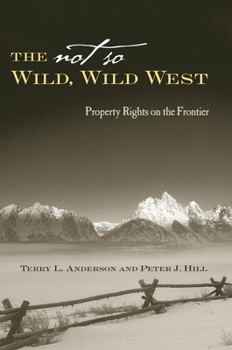The Not So Wild, Wild West: Property Rights on the Frontier
Select Format
Select Condition 
Book Overview
Mention of the American West usually evokes images of rough and tumble cowboys, ranchers, and outlaws. In contrast, The Not So Wild, Wild West casts America's frontier history in a new framework that emphasizes the creation of institutions, both formal and informal, that facilitated cooperation rather than conflict. Rather than describing the frontier as a place where heroes met villains, this book argues that everyday people helped...
Format:Hardcover
Language:English
ISBN:0804748543
ISBN13:9780804748544
Release Date:May 2004
Publisher:Stanford Economics and Finance
Length:280 Pages
Weight:1.15 lbs.
Dimensions:1.3" x 6.3" x 9.1"
Customer Reviews
5 ratings
It's not Right or Left, it's libertarian
Published by Thriftbooks.com User , 14 years ago
Though I don't have definitive proof, I believe this is an expansion of a research piece originally written in the late 1970's and published in The Journal of Libertarian Studies (vol 3, issue 1). The original title was "American Experiment in Anarcho-Capitalism: The Not So Wild, Wild West".
A good read even if not for a class.
Published by Thriftbooks.com User , 17 years ago
This book was a assigned for a political economy class but was interesting and easy to read. I am keeping this book as it explains a lot about human behavior and had examples showing how people have always cooperated to meet their own goals.
Unbelievable - Buy it!
Published by Thriftbooks.com User , 17 years ago
I don't have a lot of time to really give this review its due. However, I highly recommend this book to anyone trying to deepen their understanding of how property rights have affecteed and continue to affect our society. Hill is as gifted of a teacher as he is an economist and he and TA complement each other immensely.
The debate over property rights made fun!
Published by Thriftbooks.com User , 18 years ago
This book is written by two scholars who would describe themselves as free market environmentalists. If you don't know what that is, you should probably read this book. In contrast to other tomes on such matters, it engages the topic through inherently fun examples, taken from the "Wild West" in US history. In the first chapter, Anderson and Hill discuss various systems of property rights on the Wild West: tribal institutions, fur traders, miners in the Sierra Nevada, water rights of prior appropriation, and Cattlemen's associations. The second chapter provides a general review of the concept of property rights and how they are designed. Anderson and Hill recognize from the start that many people use systems of property rights to benefit themselves at the expense of others. This "rent-seeking" often involves messing with the market, and harms society as a whole. In short, Anderson and Hill recognize (at least in principle) that property rights may not always be efficient in economic terms. They are fair minded, at least in principle, allowing that government, local communities, and/or entrepreneurs might each provide solutions to these problems in both theory and practice. The next two chapters make this abstract argument concrete by looking at property rights in Indian country. Obviously, most Indian lands were taken by force or by the threat of force, an excellent example of rent-seeking by whites with tragic effects for Natives. After this, the authors turn to a series of other property rights issues in the West, from fur traders and wagon trains to mining camps and Mormon irrigation. The core claim is that American economic successes reflect the ability of local communities to develop new institutions of property rights to solve the novel problems that they found. In contrast, when rent-seekers establish property rights that benefit them at the expense of others, bad things happen. Given their own leanings, Anderson and Hill tend to see "good property rights leading to good outcomes" more than they see rent-seekers perverting markets and harming the environment. However, the misuse of both political and economic power is ubiquitous, and should have been acknowledged more in practice. They do recognize the bad treatment of Indians, but apparently don't find much bad behavior by whites against other whites. The book makes some pretense of presenting an overall theory, but it really has only a framework that allows the authors to tell a bunch of interesting "just-so stories." They also do not given any attention to research design or case selection, nor do they provide a justification for telling these particular stories as opposed to others. They pose the book as providing a revisionist history, against the myth of violence on the Wild West. They're successful in telling an alternative story, but to do that, they left some things out - - most notably the railroads. Though it's easy to read this book as part of the Right,
Law and Order in the Wild, Wild West
Published by Thriftbooks.com User , 19 years ago
P.J. Hill and Terry Anderson, two very respected American economists, have written a very thoughtful book about the spontaneous emergence of law and order in the "Wild, Wild West" of yesteryear. Their love of the great outdoors and of their native state of Montana shows through and through in this beautiful tome. They delve into a variety of fascinating topics in their book, such as the gold rush, the fur trade, the wagon trail, and the Indian wars. In addition, they provide a wonderful overview of the theory of property rights, and their book contains many helpful maps, well-organized charts, and some beautiful pictures. Anyone who is interested not only in the history of the American West but also in economics generally and property rights specifically should take the time to read this book. I heartily recommend their book to anyone with an interest in these topics.






